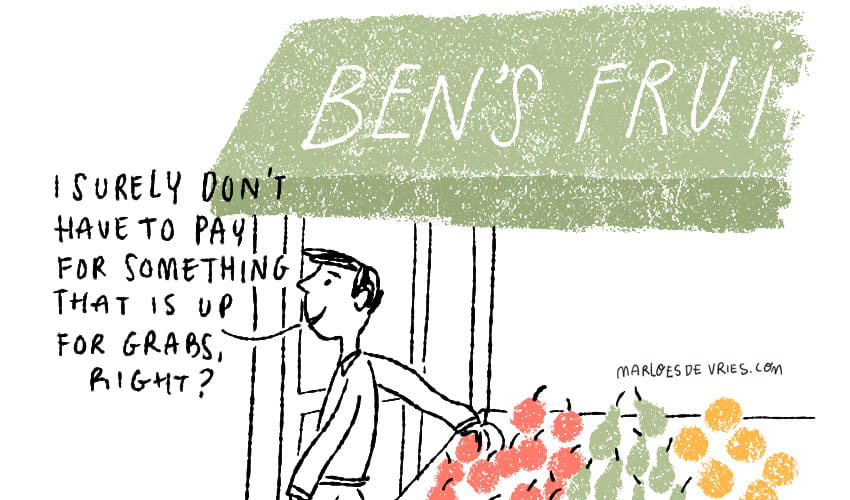Copyright myth #1: ‘free to access’ means ‘free to reuse’
By Christina Daouti, on 26 February 2024
This year we are marking Fair Dealing Week (26 February to 1 March 2024) with a series of blog posts addressing some copyright myths. Our first post starts with a simple but important message.
‘Free to access’ does not necessarily mean ‘free to reuse’.
You are in the middle of preparing a thesis chapter, a journal article, a pice of coursework or a lecture. You want to include materials created by others: photos, diagrams, text, or video. Some of these materials are publicly available on the web: an image you found in a Google search, a publicly available website, a Youtube video. Do you need permission to reuse them?
The default answer is ‘yes’. Unless it is clear – via a statement or licence – that you can reuse the material, by default you need to to ask the copyright owner for permission to reproduce, share or adapt the material in your own work.
There is a common misconception about images discovered on the Inernet. If they are free to view and download, surely they are also free to reuse, for example share on social media, include in an article or insert in presentation slides? The answer is ‘no’: this is not the case. For example, to reuse this illustration by artist Marloes de Vries (which sums up the issue really well) I got permission – not only because not doing so could result in a take-down notice and/or the payment of a fine but also, crucially, because it would be disrespectful to their work to do otherwise. You can read more on this from the artist.

Image created by Marloes De Vries: https://marloesdevries.com/blog/copyright-infringement/. Reproduced with the artist’s permission.
What about using material under ‘fair dealing’?
In the UK, you may be able to rely on certain copyright exceptions to use limited amounts of materials without permission: these include copying for your own private study, using materials to illustrate a point in teaching, and including materials in the context of a thesis or article etc. Relying on these exceptions is subject to ‘fair dealing’: thinking of whether, by using the material, you are being fair and honest. You need to think
- how well your use is supported by the exception
- whether the extent of your use is justified by your purpose (for example, are you using more than you need to explain something in a presentation or support an argument in a paper?)
- whether your use is at odds with the interests (economic or otherwise) of the author.
Copyright exceptions exist in the legislation for a reason. You are encouraged to consider using them in the context of your research and teaching. To rely on them with more confidence, you may want to learn more about them. Here are three things you can do:
1. Complete our 7-question copyright exceptions quiz.
This is to help you understand copyright exceptions better: you can submit answers anonymously and we won’t be using your responses for any purpose.
2. Register for one of our sessions, on Teams or in person.
Our sessions cover copyright for PGRs, research staff and teaching staff; open licences; and publishing contracts.
3. Ask us a question.
Contact us to ask a question, arrange an appointment or schedule your own training session.
 Close
Close


